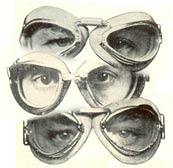|
ACE & RUM RUNNER
William T. Ponder, ca. 1932
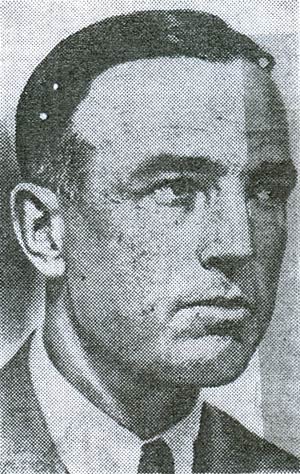 |
William Ponder was born March 16, 1891 at Llano, TX to William Perry Ponder (1864-1941) and Mary Cornelia Smith (1873-1947). The 1900 U.S. Census, his first, placed him living with his parents, a sister and brother, in Francis Township, OK. His father was a farmer.
In 1910, the Census placed him (at age 19) and his family living in Jester, OK. His father's occupation was coded as "Stock raiser." Living with them was a hired had.
William Thomas Ponder was described in The Lafayette Flying Corps, Volume 1, pp. 388-89 as, "...the ideal Westerner, large, good-natured, and laconic. He is essentially a man of action, and it needed the setting of the Front to throw into relief his splendid qualities of daring and aggressive skill." This Dartmouth College graduate was an ace during WWI, downing seven (although this source, page 8, cites only six).
His experiences during the War moved rapidly. Ponder enlisted on June 4, 1917. He was assigned to the French aviation school at Avord, France from June 19, 1917 to February 1, 1918.
He arrived at the Front on February 3, 1918, going to the Escadrille Spad 67. On February 27 he transferred to the American army, with the rank of second lieutenant, and was soon sent to the front again at his own request. He took part in some of the heaviest fighting of the War and made a name for himself.
The New York Times (NYT), July 31, 1918, reported an incident where Ponder was missing for a couple of days, below, left. This incident was reported in several newspapers across the country. He was promoted to first lieutenant November 2, 1918, and to captain on May 12, 1919.
The New York Times, July 31, 1918 (Source: NYT)
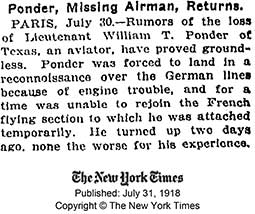 |
For his service he received the Distinguished Service Cross (DSC) for breaking up a an attack by 13 enemy planes on a lone American flyer near Fontaines, France on October 23, 1918. He shot down one enemy aircraft on that occasion. He also received the Croix de Guerre with four Palms, and three unit citations. Below, right, from Popular Aviation (PA) magazine, July, 1935, is an article describing the circumstances of his DSC award.
W.T. Ponder, DSC, Popular Aviation Magazine, July, 1935 (Source: PA)
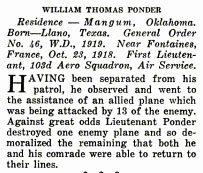 |
It is not clear from the NASM record when he left the military. He married a French woman, Mlle. Jeanne Marie Dezerville (1892-1972) while in Paris. The 1920 Census placed him at age 28 living in Jester, OK with his parents (now aged 55 and 46). His wife, Jeanne, was with him, having immigrated and been naturalized in November, 1919. Besides two brothers, a niece, Norma Elkins, 17, also lived with them. Her occupation was coded as "Teacher" in a "Public School." Interestingly, his father was now a "Dealer" in "Real Estate," and his younger brother, Charles Elmer (26; 1893-1974), was a "Ball Player" for the "National League."
Ponder returned to his home in Mangum, OK where he was city manager for two years. He then moved to Ft. Worth and had, "an agency for an aircraft corporation." He and Jeanne had two daughters, Colette (1921-2008) and Janine (1922-2016). The hyperlinks will take you to their online obituaries.
Ponder signed the Tucson Register twice as a civilian. Each time he flew Cessna NC4724. His first landing was solo on Monday, September 10, 1928 at 11:30 AM. Based at Ft. Worth, TX, he departed westbound at 12:30 PM to Los Angeles, CA.
His second landing was on Friday, September 14, 1928. This time he was eastbound from Los Angeles carrying three unidentified passengers. They did not list a departure time or destination, but they were probably returning to Ft. Worth.
Interestingly, an article that appeared in The New York Times, April 14, 1931, asked that the reading public provide the addresses of 28 "Missing Aces" that somehow were lost from military records at the time. Ponder's name was among them, having downed six enemy aircraft while serving with the 103rd Squadron.
Pampa Daily News (TX), May 26, 1932 (Source: newspapers.com)
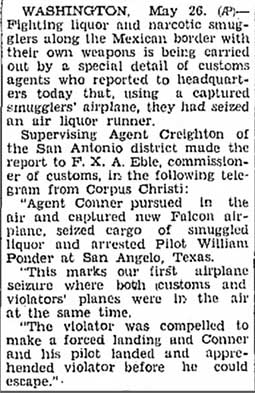 |
Four years after his last landing at Tucson, an article in The Pampa Daily News (TX), May 26, 1932, left, reported Ponder's arrest for smuggling liquor. The Washington, DC Evening Star of Friday May 27, 1932 is headlined, "ACE GIVES BOND AS BEER RUNNER". The article says he was followed in the air from Mexico by U.S. Customs agents as he flew north and landed at San Angelo, TX. The agents searched his airplane and charged him with, "unlawfully receiving and facilitating in the transportation of certain imported merchandise, to wit: 627 bottles of Carta Blanca beer."
Ironically, the Customs agents were flying in another aircraft confiscated from another rum runner. Notable is the fact that, "The capture marked the first airplane seizure where both the Government and the hunted craft were in the air."
Given that a bottle of beer weighs about 1.25 pounds, he was carrying about 784 pounds of beer. This comprised a fairly full load for the civilian mailplane version of the Curtiss Falcon, leaving only a couple of hundred pounds for pilot and fuel.
The DC Evening Star article continues, "Three old planes seized from smugglers are being used by a special detail of customs agents in the fight to stop narcotic and liquor smuggling across the Mexican border." Ponder's Falcon probably joined the federal fleet.
Amarillo Globe-Times (TX), February 27, 1947 (Source: newspapers.com)
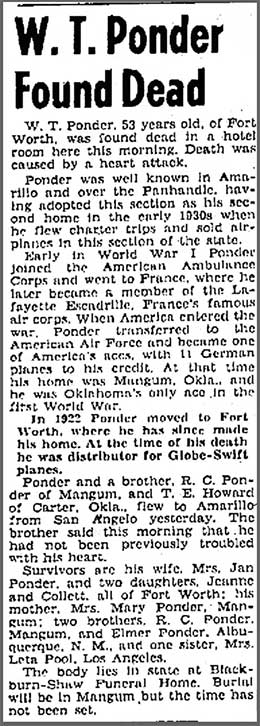 |
The Washington Post of the same date has details a little different (citing two different customs agent names as the captors and 1,000 bottles of beer as the contraband), but provides a little more insight into Ponder who stated, "I took a sporting chance and here I am .... I'm not pleading guilty to anything." He was held in $1,500 bond. We also learn that his airplane was a blue biplane, which had been used commercially in a Dallas-Chicago run. Similar articles near the same date ran in several newspapers across the country.
This wasn't enough for Ponder. The Washington Post of November 19, 1932 records another smuggling incident. This time he was chased again by the same customs agents and brought down under threat of rifle fire in a field 30 miles east of San Antonio, TX. He had crossed the Rio Grande River between Eagle Pass and Laredo, TX this time carrying "80 gallons of alcohol."
The Washington Post of Saturday, April 8, 1933 is headlined "Flying Ace Sentenced In Alcohol Smuggling". He was sentenced to six months in the Federal detention camp at La Tuna (north of El Paso, TX; still in operation) and fined $1,000. It is not clear from the record if his pilot certificate was revoked. Today it would be.
W.T. Ponder, Grave Marker, 1947 (Source: findagrave.com)
 |
Ponder flew West on February 27, 1947 at Mangum, OK. His obituary, from the Amarillo Globe-Times (TX), of that date is at left. This article states that he was married to Jan, which was a nickname for Jeanne. Later in life they lived separate, but amiable, lives. She stayed in Ft. Worth and he had a ranch in San Angelo. And, speaking of nicknames, his was "Wild Bill," which is not hard to understand given his exploits.
The New York Times of February 28, 1947 also published his obituary. His portrait, top of page, is from that article. He died in a hotel room in Amarillo, TX of a "heart ailment." He was 53 years old. The NYT article summarizes his WWI exploits. No mention of his smuggling activities was made. His NYT obituary ended simply by saying, "After the war Captain Ponder engaged in commercial aviation enterprises."
His grave marker is at right. A short biography that appears at findagrave.com is below. Other photographs of him, including one with his wife on their wedding day, are at the link. This biography provides an overview of his working career, and mentions his bootlegging activity.
William Thomas Ponder grew up in Mangum, Oklahoma. He graduated from Dartmouth College in 1917 and then joined the American Field Service in France.
After arriving in France, Ponder enlisted in France's Service Aeronautique to fly in the Lafayette Flying Corps. Following his initial flight training conducted in phases at Avord, Pau, Cazeaux, and the G.D.E., Ponder flew as a ferry pilot delivering aircraft from the American Acceptance Park in Orly. He was then assigned to Escadrille SPA 163 where he shot down three enemy aircraft. His flying in the service of France with the Lafayette Flying Corps came to an end after the United States entered the war and he was reassigned to the 103rd Aero Squadron of the United States Air Service (USAS). Ponder was credited with three more kills with the 103rd with victory number five making him an ace.
For his service for France, Ponder was awarded France's Croix de Guerre with four Palms. For his service in the USAS, Ponder was awarded the Distinguished Service Cross with a citation that read:
"Having been separated from his patrol, Lt Ponder observed and went to the assistance of an Allied plane which was being attacked by thirteen of the enemy. Against great odds, Lt Ponder destroyed one enemy plane and so demoralized the rest that both he and his comrade were able to return to their lines."
In May of 1919, Ponder was promoted to Captain. He married Mille Jeanne Marie Dezerville while in Paris.
After World War One, Ponder returned to Mangum, Oklahoma and worked as the City Manager. The Mangum municipal airport was named Ponder Field in his honor.
[Ponder Field has since been replaced by a newer airport (Scott Field) located a few miles Southwest. The Mangum Golf Course is on the Ponder Field site.]
Ponder departed Mangum and had a variety of jobs over the years. He worked in a newspaper and magazine agency in Fort Worth, he delivered aircraft for Lockheed, and he worked in an oil contracting business.
Ponder made national news in 1932 at the end of the era of Prohibition (1920-1933) when he was twice arrested for smuggling alcohol from Mexico into the United States by airplane. The articles sensationally and inaccurately described him as America's second highest scoring ace.
During World War Two, Ponder worked for the Consolidated Vultee Aircraft Corporation (Convair). After the war, he delivered Globe Swift aircraft from San Angelo, Texas along with his brother Rebis.
William Thomas Ponder died of a heart attack in his hotel room in Amarillo, Texas, while on a business trip.
[Reference: "The Lafayette Flying Corps: The American Volunteers in the French Air Service in World War One," by Dennis Gordon. Schiffer Military History, Atglen, PA: 2000. Page 360.] |
---o0o---
Dossier 2.1.128
UPLOADED: 07/01/08 REVISED: 06/29/14, 02/07/17
|

